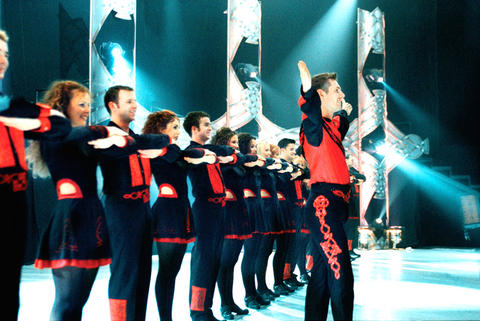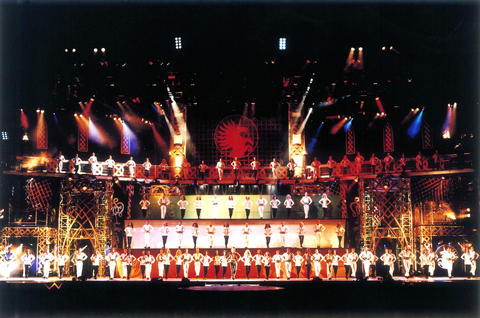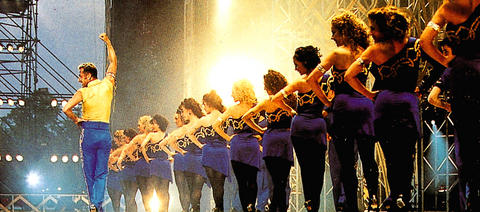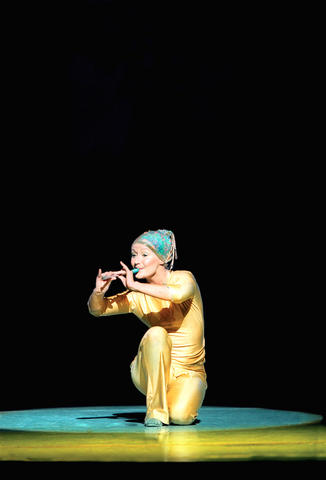Bare chested men in leather pants, women with long tresses and short skirts, lines of dancers stamping in unison - this is the image that Michael Flatley's tap dance extravaganzas evoke. Critics sniff at the shamelessly flashy Vegas-style pageantry and purists are repelled by what is thought to be a bastardized rendering of a once-obscure art form, but millions of fans cheer Flatley's lordly presence. Feet of Flames, recreated for this Taiwan tour nearly 10 years after its legendary premiere in Hyde Park, London, is a dance blockbuster that mixes contemporary choreography, Celtic dance and music with pyrotechnics, explosive visual effects and video displays designed to overwhelm.
Flatley's story is well-known. The son of a Chicago construction contractor who immigrated from Ireland, Flatley was brought up in a house with a solid work ethic and two champion Irish dancers - his mother and grandmother. With an almost manic drive to raise himself up in the world (Flatley once reportedly said that he didn't have time to read anything other than self-help and motivational books) the then-aspiring lad managed to become the first American World Irish Dance Champion at 17. His first big break came when he scored a gig with the Chieftains in the 1980s, which eventually led to an interval act for the 1994 Eurovision Song Contest. The seven-minute prototype of Riverdance performed there was expanded into a full-length production and made Flatley an instant star. Flatley left the production amid a bitter dispute over the copyright of the Riverdance routines and went on to stage The Lord of the Dance in 1996. The rest is history.
Dubbed the turbo-charged reworking of Lord of the Dance, Feet of Flames was created in 1998, following the same storyline but doubling the number of dancers and adding new music, numbers, sets and costumes. The dance spectacle is representative of Flatley's updated and popularized version of traditional Irish step dancing.

PHOTO: COURTESY OF KHAM
Credited to Irish parish priests who developed the dance style due to concerns about lascivious bodily display, step dancing involves a stiff torso and rigidly held arms juxtaposed against quick, precise movements of the feet. In the skillful hands of Flatley, the staid dance was turned into a showbiz spectacular glazed with full-on sexuality and expressive choreography.
For those who aren't familiar with the story, Feet of Flames recounts the perennial tale of the battle between good and evil, represented by the Lord of the Dance and Don Dorcha, the Dark Lord. A lusty romance sub-plot spices things up with Irishwoman Colleen Saoirse winning the heart of the Lord of the Dance from the wicked temptress Morrigan.
Flatley himself will not dance in the Taiwan shows, and the lead role will be played by Damien O'Kane, who played Flatley's original role when Lord of the Dance visited Taiwan in 2004.

PHOTO: COURTESY OF KHAM
According to Yang Yu-tsun (楊玉存) of Kuang Hong Arts (寬宏藝術), restaging Feet of Flames in Taiwan after its world tour ended seven years ago was made possible by the almost insatiable thirst that Taiwanese audiences have for Flatley's shows. Lord of the Dance, which was staged here in 2004 and 2005, and Celtic Tiger a year later, all proved enormously successful.
"When Flatley came with Celtic Tiger in 2006, we suggested the possibility of bringing Feet of Flames to Taiwan since so many people love his shows," Yang said. "After six months of communications and persuasion, Flatley finally agreed to re-stage the production in Taiwan."
The two-hour show has cost over NT$100 million to stage in Taiwan, and every effort has been made to match the grand scale of the original London production. Nearly 100 dancers will sashay, prance and leap on the multi-tiered stage against displays of pyrotechnics and rear-screen projections. Around 20 crew members have been flow in from the UK to construct the set with the aid of local theater technicians. The troupe has been rehearsing intensively in Kaohsiung for the last two weeks, but requests for interviews were rejected.

PHOTO: COURTESY OF KHAM
Performances in Taipei and Taichung are nearly sold out. Tickets for the Kaohsiung and Tainan shows are selling quickly. Flatley may have taken his last curtain call as the Lord of the Dance, but the show he created and continues to direct still works box office magic.

PHOTO: COURTESY OF KHAM

Towering high above Taiwan’s capital city at 508 meters, Taipei 101 dominates the skyline. The earthquake-proof skyscraper of steel and glass has captured the imagination of professional rock climber Alex Honnold for more than a decade. Tomorrow morning, he will climb it in his signature free solo style — without ropes or protective equipment. And Netflix will broadcast it — live. The event’s announcement has drawn both excitement and trepidation, as well as some concerns over the ethical implications of attempting such a high-risk endeavor on live broadcast. Many have questioned Honnold’s desire to continues his free-solo climbs now that he’s a

As Taiwan’s second most populous city, Taichung looms large in the electoral map. Taiwanese political commentators describe it — along with neighboring Changhua County — as Taiwan’s “swing states” (搖擺州), which is a curious direct borrowing from American election terminology. In the early post-Martial Law era, Taichung was referred to as a “desert of democracy” because while the Democratic Progressive Party (DPP) was winning elections in the north and south, Taichung remained staunchly loyal to the Chinese Nationalist Party (KMT). That changed over time, but in both Changhua and Taichung, the DPP still suffers from a “one-term curse,” with the

Jan. 26 to Feb. 1 Nearly 90 years after it was last recorded, the Basay language was taught in a classroom for the first time in September last year. Over the following three months, students learned its sounds along with the customs and folktales of the Ketagalan people, who once spoke it across northern Taiwan. Although each Ketagalan settlement had its own language, Basay functioned as a common trade language. By the late 19th century, it had largely fallen out of daily use as speakers shifted to Hoklo (commonly known as Taiwanese), surviving only in fragments remembered by the elderly. In

William Liu (劉家君) moved to Kaohsiung from Nantou to live with his boyfriend Reg Hong (洪嘉佑). “In Nantou, people do not support gay rights at all and never even talk about it. Living here made me optimistic and made me realize how much I can express myself,” Liu tells the Taipei Times. Hong and his friend Cony Hsieh (謝昀希) are both active in several LGBT groups and organizations in Kaohsiung. They were among the people behind the city’s 16th Pride event in November last year, which gathered over 35,000 people. Along with others, they clearly see Kaohsiung as the nexus of LGBT rights.